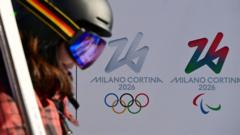Will Russia and Belarus Return to the Paralympics?

Published: 2025-09-27 07:45:24 | Category: sport
The Winter Paralympics, scheduled from 6-15 March, will witness approximately 600 athletes competing in 79 medal events across six sports. Recently, the International Paralympic Committee (IPC) lifted the partial suspensions of Belarus and Russia, which had been in place since the onset of the Ukraine conflict in 2022. This decision has sparked discussions about the future of these nations in international sporting events, particularly regarding their participation in the upcoming Winter Paralympics.
Last updated: 22 October 2023 (BST)
Key Takeaways
- The IPC has lifted partial suspensions for Belarus and Russia, allowing them to regain full membership rights.
- Both countries had been suspended since Russia's invasion of Ukraine in 2022.
- Despite IPC's decision, the governing bodies of the six sports in the Winter Paralympics still maintain bans on athletes from these nations.
- Russian and Belarusian athletes competed as neutrals at the Paris Paralympics.
- The IPC aims to facilitate the return of these nations to full competition status by 2026.
The IPC's Decision: Context and Implications
The IPC's recent vote to restore the full rights of Belarus and Russia within its organisation has significant implications for the Paralympic movement. Since the suspension in 2022, both nations have faced considerable scrutiny and debate regarding their participation in international competitions.
During the IPC's general assembly in Seoul, member organisations overwhelmingly voted against motions to maintain or extend suspensions against both countries. The results were indicative of a shift in perspective among IPC members, with a 111-55 vote against fully suspending Russia, and a 119-48 vote against fully suspending Belarus. These votes signal a desire to reintegrate these nations into the global sporting community, albeit under strict guidelines.
What Does This Mean for Future Competitions?
With the reinstatement of full IPC membership rights, Belarus and Russia could potentially compete under their national flags at the Winter Paralympics in Milano Cortina in March 2026. However, this is contingent upon the decisions of the international bodies governing each sport included in the Winter Paralympics.
Currently, these governing bodies have upheld a ban on athletes from both nations. The IPC has stated that it will work with Russia and Belarus to arrange practical steps to facilitate their participation, indicating that while the political landscape is shifting, practical realities still pose challenges.
Neutral Status at Previous Competitions
In a notable development, Russian and Belarusian athletes were permitted to compete as neutrals at the Paris Paralympics, reflecting a compromise after extensive discussions led by the IPC. This approach aimed to balance the principles of inclusion and fair competition while addressing the broader geopolitical issues stemming from the Ukraine conflict.
As the IPC prepares for future events, it remains to be seen whether similar arrangements will be made for Milano Cortina or other upcoming competitions. The IOC has also indicated that Russian and Belarusian athletes will be allowed to compete in the Winter Olympics under a neutral flag, further complicating the situation.
The Broader Impact on the Paralympic Movement
The decision to lift the suspension raises questions about the integrity of the Paralympic movement and the principles of fair competition. Many athletes, officials, and fans are concerned about the implications of allowing nations involved in significant geopolitical conflicts back into the fold of international sport.
Supporters of the IPC's decision argue that sport should be separate from politics and that athletes should not be penalised for the actions of their governments. Conversely, critics argue that allowing countries like Russia and Belarus back into competitions undermines the values of the Paralympic movement, particularly in the wake of ongoing conflicts.
Next Steps for IPC and Member Nations
The IPC has a critical role in navigating this complex landscape. It must balance the need for inclusivity with the ethical considerations surrounding international sports. The IPC's commitment to working with Russia and Belarus indicates a willingness to engage with these nations while also ensuring that the spirit of competition remains intact.
As the 2026 Winter Paralympics approach, the IPC will need to clarify its policies and the conditions under which Belarus and Russia can compete. This will likely involve ongoing discussions with various stakeholders, including national Paralympic committees and international sports federations.
Conclusion: A New Era for the Paralympic Games?
The return of Belarus and Russia to the Paralympic fold may signify a new chapter in the history of the Games. As the IPC works towards practical arrangements for these nations, the global sporting community will be watching closely. The decisions made in the coming months will shape not only the Winter Paralympics in 2026 but also set precedents for how international sport responds to geopolitical tensions.
As we move forward, it is crucial to consider how these developments will impact athletes, the integrity of the Games, and the perceptions of fairness in competition. With the IPC's commitment to facilitating participation while adhering to strict conditions, the future remains uncertain yet hopeful for inclusivity in sports. #WinterParalympics #IPC #InclusiveSport
FAQs
What are the Winter Paralympics?
The Winter Paralympics are an international multi-sport event for athletes with disabilities, held every four years. The next event is scheduled for 6-15 March 2026 in Milano Cortina, Italy.
Why were Belarus and Russia suspended from the Paralympics?
Belarus and Russia were suspended due to political actions and military conflicts, specifically following Russia's invasion of Ukraine in 2022. The IPC aimed to uphold the integrity of the Games in light of these events.
Can Russian and Belarusian athletes compete under their flags now?
While the IPC has lifted the partial suspensions, international bodies governing individual sports still maintain bans on athletes from these countries. Future participation under national flags remains uncertain and subject to further developments.
What is the neutral status for athletes?
Neutral status allows athletes from suspended countries to compete without their national flags or anthems. This was implemented for Russian and Belarusian athletes during the Paris Paralympics to ensure their participation while addressing geopolitical issues.
What are the implications of the IPC's recent decision?
The IPC's decision to restore full membership rights to Belarus and Russia may lead to their participation in future competitions, but it raises questions about the fairness and integrity of the sport amid ongoing geopolitical tensions.



